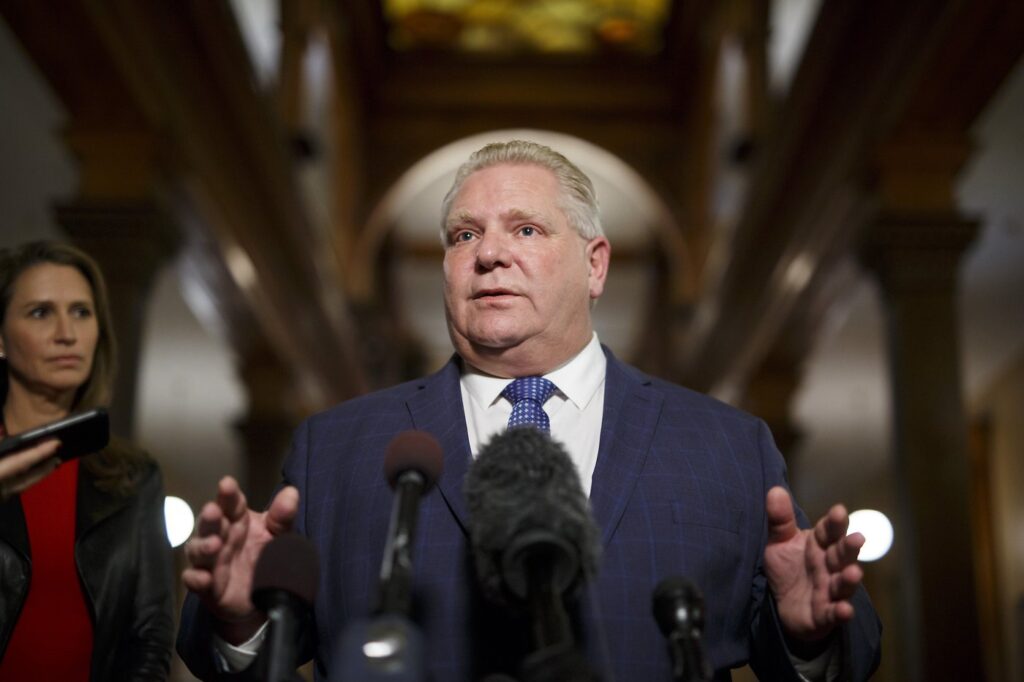With emotions running high over Canada’s trade standoff with the US, Ontario Premier Doug Ford’s attempt to take his anti-tariff message directly to Americans appears to have backfired.
The $75-million ad campaign that used clips from former US president Ronald Reagan speaking out against tariffs, prompted President Donald Trump to end trade talks with Canada late Thursday.
Ford capitulated quickly after speaking with Prime Minister Mark Carney and announced that Ontario will pause the US advertising campaign on Monday so negotiations can resume.
Reagan’s remarks were taken from a 1987 radio address on free and fair trade, warning that tariffs “hurt every American.”
Ford said in a statement on X, his intention was to start a conversation about the kind of economy Americans are building and highlight the impact of tariffs on workers and businesses. “We’ve achieved our goal, having reached US audiences at the highest levels. I’ve directed my team to keep putting our message in front of Americans over the weekend so that we can air our commercial during the first two World Series games.”
It’s unclear what led to the decision to pull the ads — Ford’s government did not take questions and cancelled all scheduled press conferences and public announcements.
The Ronald Reagan Presidential Foundation slammed Ontario’s use of Reagan’s 1987 trade speech, saying the ad “misrepresents the ‘Presidential Radio Address to the Nation on Free and Fair Trade’ dated April, 1987.” The foundation said the Ontario government did not have permission “to use and edit the remarks,” and it is reviewing legal options.
Ford capitulated quickly after speaking with Prime Minister Mark Carney and announced that Ontario will pause the US advertising campaign on Monday so negotiations can resume.
Trump seized on the ad as proof that Canada is acting in bad faith, saying it showed “egregious behavior” aimed at influencing US court decisions, and he ended trade talks with Canada “effective immediately.”
Experts say Ford’s move was “unsophisticated” and provinces are better off letting Ottawa lead the file.
Professor Andreas Schotter, an international business expert at Western University’s Ivey Business School, said the ad campaign complicated national trade negotiations. Ottawa should be left to continue quiet negotiations while provinces focus on state-to-state cooperation, instead of “lashing out at that level,” Schotter said. “This ad campaign was neither executed well nor necessary.”
Most Americans already know tariffs raise prices and worry about inflation, so there was no need for a public campaign during active trade talks, he added.
Schotter said Ontario’s failure to get permission from the Reagan Foundation was “almost stupid,” and “so unprofessional, unbelievable.”
Pulling the ad will not fix the situation because Trump “wants to have something out of that misstep,” Schotter added. Carney is “trying to do the right thing,” but should speak more directly to Canadians to ease growing uncertainty.
This is not the first time Ford has angered Trump. Earlier this year, his government briefly proposed a 25 per cent electricity export tax aimed at Michigan, New York and Minnesota in retaliation against tariffs. He dropped the plan after Trump threatened new tariffs on Canadian exports.

Responding to US tariffs has also divided Canada’s premiers. At a premiers’ summit in Huntsville, Ont., this year, Conservative premiers Ford and Danielle Smith of Alberta clashed over how to deal with Washington, especially on energy exports.
Fred Lazar, an economics professor at York University’s Schulich School of Business, said the trade conflict with the US is a national issue that should be handled by Ottawa, with provinces staying on the sidelines, rather than acting alone.
Lazar said provinces can share their concerns privately with the federal government, but public moves, such as ad campaigns or export taxes, only make negotiations harder.
These actions, he said, risk sending mixed signals to Washington and giving Trump more leverage.
He said Ford’s repeated attempts to act alone — from the proposed export tax to the US ad campaign — seems driven more by politics than policy.
Ford is trying to build a national image as a defender of Canadian interests, positioning himself for future political opportunities, rather than focusing on what will help trade talks succeed, Lazar said.
While public posturing might win short-term attention, it rarely achieves real results in trade disputes, he added. Canada’s best strategy is quiet diplomacy led by Ottawa, while provinces focus on supporting local industries affected by tariffs, Lazar said.
Unity remains Canada’s greatest strength, he noted. When the provinces speak with one voice, it strengthens Ottawa’s hand at the table and shows the US that Canada is serious and organized.







